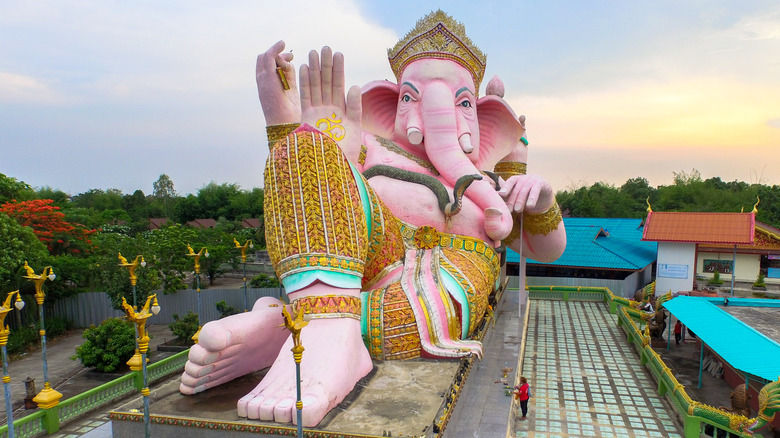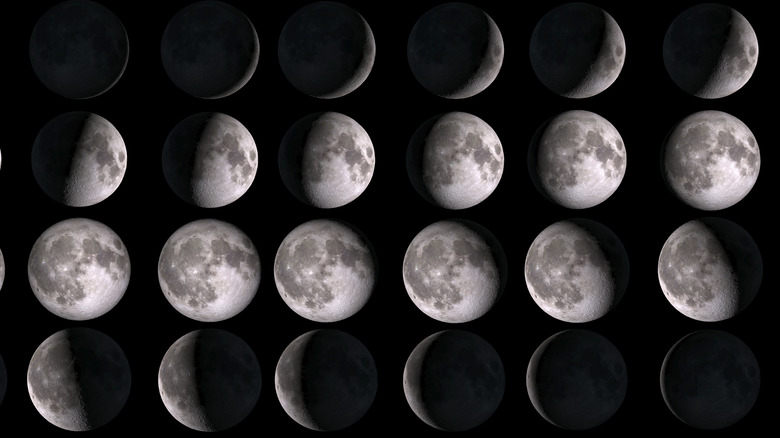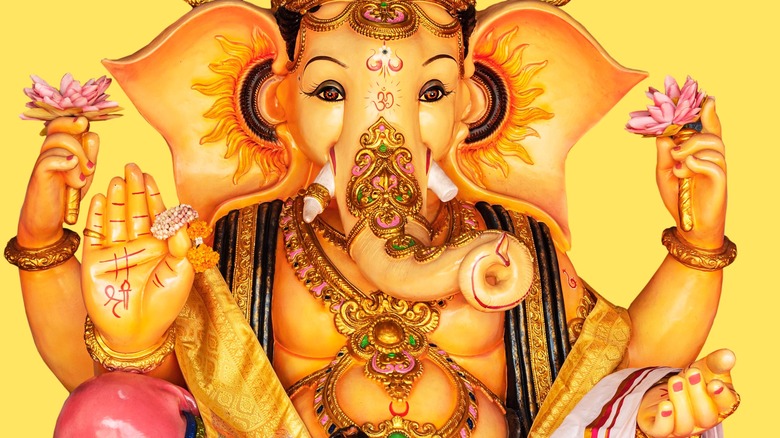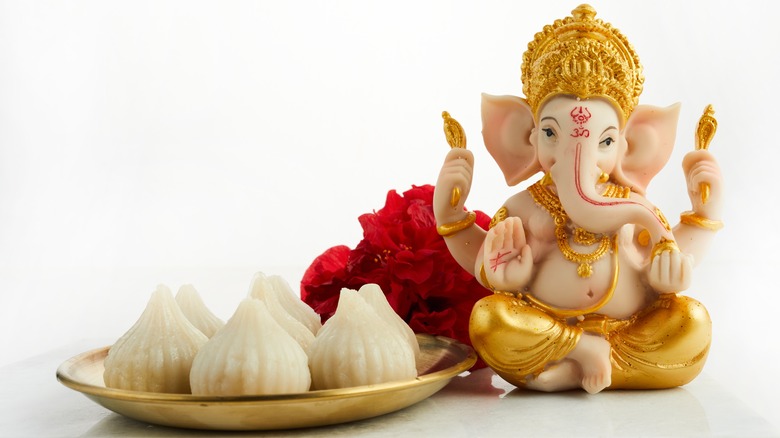How Hindu Traditions Explain The Phases Of The Moon
The Hindu calendar, Panchangam, is based partly on astrological elements including the lunar cycle, per Himalayan Academy. According to the almanac, the moon should not be observed on certain days, including the birthday celebration of the god Ganesha. During this Hindu celebration, gazing upon the moon is thought to bestow a surprisingly specific curse.
During mid-August to mid-September, the Hindu festival Ganesh Chaturthi celebrates the birthday of the elephant-headed god, Ganesha. In some regions the celebration can last for 10 days, via Learn Religions. According to the Panchangam and Temples in India Info, there are two consecutive days in the moon's waxing phase when one should not look at it. Breaking this rule will leave the viewer with the curse of the moon, according to Learn Religions. The fascinating legend of the moon curse is also a creation story for why the moon displays phases over a month.
Legend says that Lord Ganesha, the son of Lord Shiva and the goddess Parvati, was celebrating his birthday, per Learn Religions. Lord Ganesha had just feasted on an extensive spread offered by the god of riches. Ganesha has a massive sweet tooth, and had especially enjoyed a number of his favorite modak dumplings made with jagged coconut, per Ensures. The moon god, Chandra Dev, shone bright above Ganesha as he returned to the mountain Kailash late at night, via Art Predator. Then ill fortune befell them both.
The moon dishonored a god
There are numerous different renditions of Ganesha's birthday accident. One describes Ganesha as mounted on his riding mouse while traveling home. The moon was out, shining pristine across the landscape. Out of nowhere a snake crossed the path of the rider and steed. The riding mouse reared, throwing Ganesha and scurrying away from the predator. As Ganesha hit the ground, his stomach split open, spilling numerous modaks across the ground, via Ensures.
The moon god Chandra Dev couldn't contain himself. Ganesha looked up to see Chandra Dev laughing at him from the sky, via Learn Religions. Lord Ganesha seethed with rage, per Ensures. He cursed the moon for laughing, and for his pridefulness and vanity, according to Learn Religions. Lord Ganesha broke off one of his elephant tusks and hurled it, disfiguring the moon with a crater. Now marred, Ganesha further diminished Chandra Dev's glory. He decreed that the moon shall always be disfigured and never be whole again. But more than that, a curse should befall anyone who looks upon the moon's beauty, according to Ensures.
The curse of mithya dosha
The moon god begged forgiveness for his disrespectful laughter. The Lord Ganesha recognized the sincerity of Chandra Dev's apologies and realized his haste. He could forgive the moon, but the curse delivered could not be undone. Ganesha instead restricted the curse. The moon's beauty would at first fade, but then grow to shine at full for one night a month, per Learn Religions.
As for the curse upon viewing the moon, it would be diminished. This curse of the moon or Mithya Dosha should only apply on Ganesha's birthday celebration. It decreed that anyone who looked upon the moon would have troubles and be falsely accused of wrongdoing, according to Ensures.
Now, during the Ganesh Chaturthi, looking upon the moon, even by accident, is discouraged. The folklore goes that if you glance at the moon, you must recite or listen to a specific story in the ancient Hindu scriptures of Puranas, as noted by Learn Religions. This story is of how even a god could fall foul of the Mithya Dosha.
The moon curse cure
If while celebrating the Ganesh Chaturthi you should accidentally glance at the moon, there is one way to counteract the moon curse. One must recite the most famous story of the Mithya Dosha. This story tells of false accusations and redemption, via Learn Religions. It tells the legend of when the Mithya Dosha befell Lord Krishna, via Temples in India Info.
One night during the Ganesh Chaturthi celebration, Lord Krishna gazed down at a bowl of milk and accidentally saw the reflection of the moon, according to Ensures. Soon, Krishna had the misfortune of requesting a beautiful jewel called Syamantaka right before it was lost. The owner Satrajit blamed Krishna for stealing the jewel. After a long ordeal of hunting down the jewel, fighting a man in a cave for 28 days, and gaining a new wife, Krishna returned the jewel to Satrajit, who repented for the false accusation. Then Krishna was gifted another wife.
To this day, the Ganesh Chaturthi should be celebrated with mindfulness towards respect for the gods. One is not to look at the moon or spend time with atheists or those that mock the gods or religion, per Learn Religions. Offerings of sweet Indian modak dumplings are made for the elephant-headed god of good luck and plenty more should be enjoyed by those celebrating, via Piping Pot Curry.



